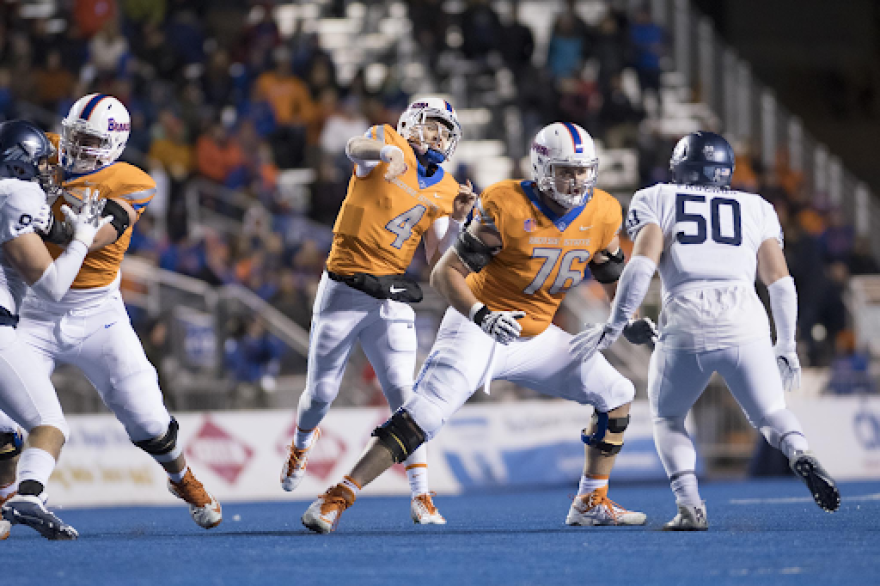Editor's note: Boise State Public Radio receives some funding from Boise State University, but the station is editorially independent.
Boise State University officials pushed to keep in-person events going as the state’s health care industry buckled under a flood of unvaccinated COVID-19 patients.
That’s according to emails obtained by Boise State Public Radio through a public records request.
In an email from Sept. 2 urging the school to keep venues open, Lisa Cochran, Executive Director at ExtraMile Arena, told Vice President and Chief Financial Officer Mark Heil that events should be used to incentivize vaccines.
“Carefully managed events” could be “part of the solution,” Cochran wrote, noting people wouldn’t just sit at home otherwise.
“They will find other outlets for their need to gather and be entertained, which poses equal if not more risk than a carefully managed event,” she continued.
Cochran suggested ExtraMile Arena could be used as a mass vaccination and testing site on game days.
Her comments also pointed out howhealth officials in Chicago found very little spread of COVID-19 at the Lollapalooza music festival over the summer, including no known hospitalizations or deaths.
Heil forwarded Cochran’s remarks to Alicia Estey, Vice President for University Affairs and Chief of Staff to President Marlene Tromp.
In his Sept. 17 email with the subject line “Football Decision,” Heil wrote, “Fundamentally, I think about what data do we have today that we didn't have a week ago. The answer is ‘not much.’”
Data across the country show little spread of the coronavirus at outdoor college football games, thoughlocal contact tracers are overwhelmed and the total scope of infections aren’t entirely known.
Ultimately, any decision to limit or activities rests with the Idaho State Board of Education.
Idaho health officials authorized crisis standards of care for all hospitals Sept. 7 to deal with an overwhelming surge in unvaccinated COVID-19 patients. Hospital executives pleaded with organizers to temporarily halt large events, deeming them unsafe.
“The fact that Idaho is a state of crisis standard of care, I believe is irrelevant to our decision,” Heil wrote.
His email came just a week before hospitals hit their peak in admissions so far. State data show 738 people were hospitalized for COVID-19 on Sept. 17, 206 of them in intensive care units.
Tromp sent a letter to the campus community late in the afternoon on Sept. 17 saying students attending the next day’s home game against Oklahoma State would need to show proof of vaccination or a negative COVID test.
The CEOs of both Saint Alphonsus and St. Luke’s health systems also signed the letter.
The decision came about a week after footage from the school’s nationally televised game against University of Texas El Paso showed vast sections of the crowd unmasked, which was against the school’s policy.
“Boise State was disappointed, after appeals by leadership in all of these areas for our fans to follow best practices, that there was poor compliance with campus public health measures at the last home football game,” Tromp wrote in her letter.
Despite the stadium's mask requirement, talking points sent to Boise State Athletics from the communications and marketing department said enforcing it “requires community cooperation.”
Sections 12-15 of Albertsons Stadium offers seating where staff “will be especially focused on monitoring facial covering compliance for the remainder of the season or until conditions improve significantly.”
Emailed responses to Tromp obtained by Boise State Public Radio protested the new entry requirements – many laden with expletives.
“This is unconstitutional and your attendance is going to be at an all-time low. I’m not paying $26,000 to be told I have to get injected in order to go view my schools [sic] football game,” wrote one student.
Boise State redacted the names of students citing a federal education privacy law.
“Stop emailing me with this crap. I don't buy into the fear porn,” another wrote.
Some asked for refunds. Other students and season ticket holders questioned how they could get tested on such short notice when the campus’s testing center had already closed for the day.
Boise State re-opened the testing center on game day to handle last-minute tests.
A handful of community members supported Tromp’s move as well.
Mike Hill said he had been a season ticket holder for 30 years, but didn’t feel comfortable going to the Oklahoma State game last month since the entry policy wouldn’t apply to all fans.
“This game is one of the biggest home games in BSU history and it’s deeply disappointing and frustrating to not enjoy it in person but we decided it’s not worth the risk,” Hill wrote.
He added he understood why a wider entry policy couldn’t have been implemented more quickly.
But just a week later, the university rescinded the vaccine and testing requirement. Estey sent an email to students, faculty and staff saying the school would instead conduct random testing within the student section.
Rob and Leann Kern from Meridian wrote to Tromp Sept. 25 saying their hearts sank upon hearing the news.
“I believe deep down you are a good person with many talents. But to our dismay and profound disappointment, and as many of your colleagues have, you got caught up in the numbers game and forgot about the human game,” they wrote in an email response.
Follow James Dawson on Twitter @RadioDawson for more local news.
Copyright 2021 Boise State Public Radio
Member support is what makes local COVID-19 reporting possible. Support this coverage here.



